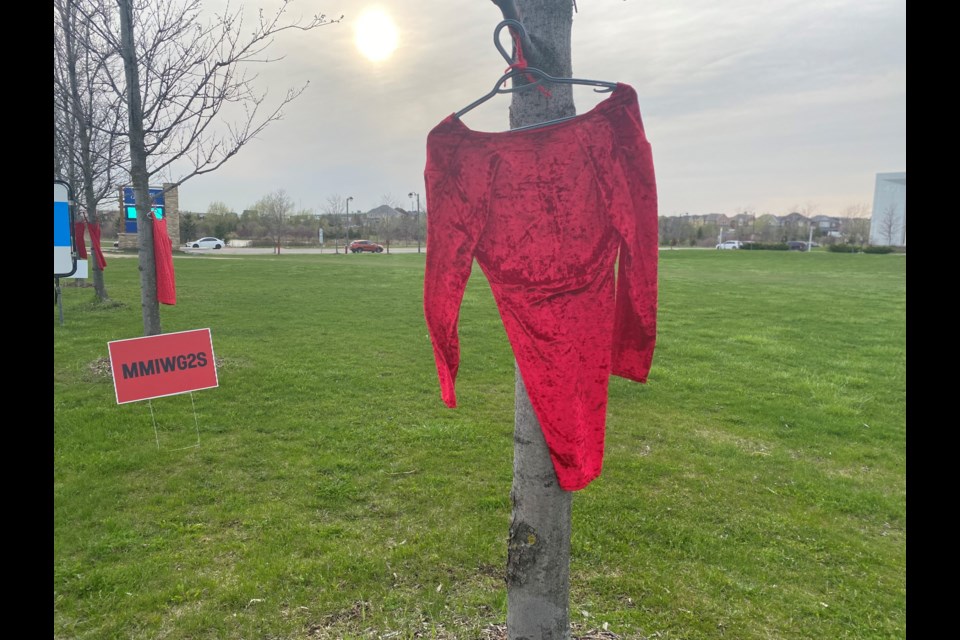Community members wearing red gathered in front of the Bradford West Gwillimbury Library Thursday evening for a special honouring ceremony recognizing Red Dress Day.
Earlier this week red dresses were draped across the trees in front of the Library as part of the art installation project for Red Dress Day on May 5, a day to remember and honour the missing and murdered Indigenous women, girls and gender diverse people (MMIWG2s+) in North America and raise awareness of the issue.
Red Dress Day is a national movement originated from the REDdress project in 2010 by artist Jamie Black, drawing attention to the murdered and missing Indigenous women across Canada. The project featured empty red dresses hung up as a visual reminder of the pain and suffering experienced by the women and their families.
Thursday night's event was organized by Bradford resident Jennifer Bahinski of Bella Lovelee Beads, and local anti-racism group Rise Up BWG, featuring guest speakers, poetry, and drum performances by The Red Spirit Singers.
"Thank you for joining and standing with us on a special day of the National Day of Awareness and Action for Missing and Murdered Indigenous Women, Children and two-spirit," Bahinksi said to the crowd of around 50 people.
Bahinski's spirit name is Thunder and Eagle Woman and is Ojibwe and Ecuadorian. Bahinksi told the attendees how she is adopted and has spent the past few years trying to reconnect with her birth family.
"I hold the Indigenous culture and my roots very close," she said.
Before introducing the drumming group, Bahinksi spoke about the instrument's significant meaning to the Indigenous community.
"It is known to be the sound of Mother Earth's heartbeat," said Bahinski.
Small red bags of tobacco were distributed to all guests to disperse near the trees, into the ground as a way to honour the murdered and missing women.
Jennifer Lloyd of Rise Up BWG read the land acknowledgement, honouring the Anishinaabe people, known as Treaty 18 in Ontario.
Afterwards, Bahinski and the rest of the Rise Up BWG members read out loud 18 of the names and ages of over 1,000 murdered and missing Indigenous women in Canada.
According to the Native Women's Association of Canada, most of the cases involve young women and girls. Just over half of the cases (55 per cent) involve women and girls under the age of 31, with 17 per cent of women and girls 18 years of age or younger. Eight per cent of cases involve women over 45. Nearly half of murder cases in NWAC’s database remain unsolved and only 53 per cent of murder cases involving Aboriginal women and girls have led to charges of homicide.
As per a press release from Rise Up BWG, today, Indigenous women in Canada are seven times more likely than non-Indigenous women to be a victim of murder and three times more likely to be violently assaulted. Thousands of Indigenous women, girls, and 2SLGBTQ+ people have gone missing or been murdered here since 1980, with a 2014 report from the Royal Canadian Mounted Police revealing that approximately three Indigenous women are murdered every month. Issues with police reporting, lack of trust in the criminal justice system, and under-investigation of the disappearances of Indigenous people mean this number is likely much higher.
In 2019, the Commissioners of the National Inquiry into Missing and Murdered Indigenous Women and Girls concluded that this level of violence amounts to a race-based genocide of Indigenous peoples, which has been empowered by colonial and patriarchal structures and policies like the Indian Act, Sixties Scoop, Residential and Day Schools, and breaches of human rights.
To make a donation to the cause, visit the Native Women's Association of Canada website at www.nwac.ca.
The NWAC was founded with a goal to enhance, promote and foster the social, economic, cultural and political well-being of Indigenous women within their respective communities.



